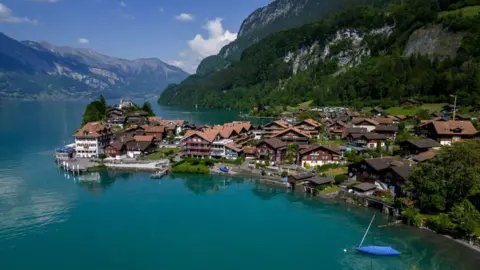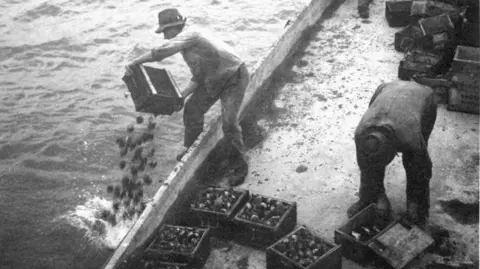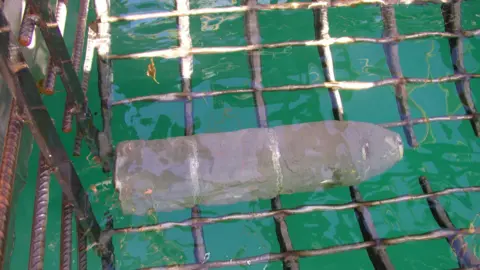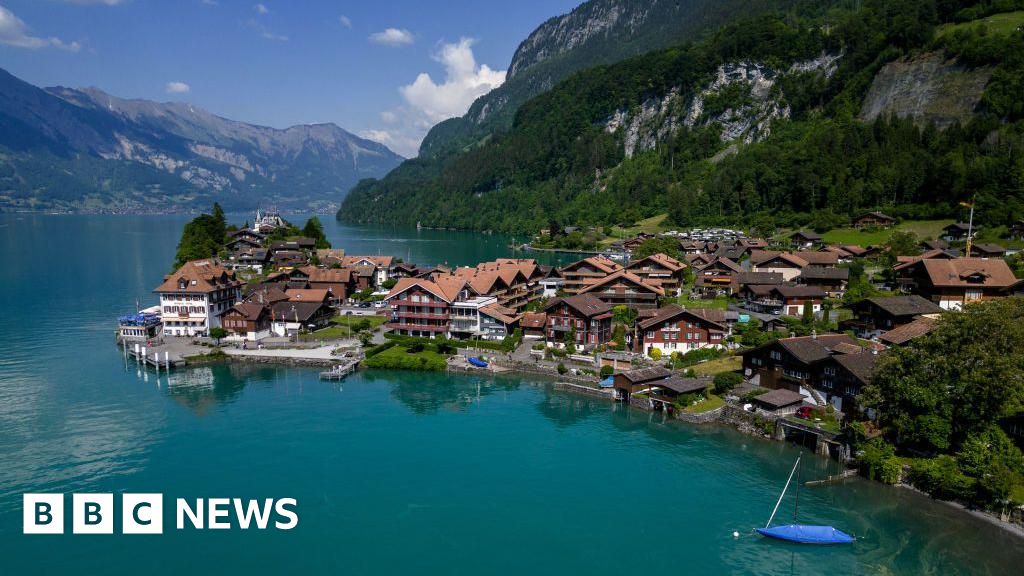 AFP
AFPVisitors admiring the postcard-like views of Lake Lucerne, Lake Thun or Lake Neuchâtel may be surprised to discover what lies beneath these pristine alpine waters.
For years, the Swiss military has used the lakes as a dumping ground for old munitions, believing they could be safely disposed of there.
There are an estimated 3,300 tons of munitions in Lake Lucerne alone and 4,500 tons in the waters of Neuchâtel, where the Swiss Air Force has been conducting bombing exercises until 2021.
Some of the munitions were located at depths of 150 to 220 meters, but other munitions in Lake Neuchâtel were only six or seven meters below the surface.
Now, the Swiss Ministry of Defense Offer 50,000 francs (£45,000) prize for the best idea.
The best three ideas for safe, environmentally friendly ammunition recovery solutions will share the prize, but the salvage operation is expected to cost billions of dollars.
double jeopardy
The fact that so many bullets were dumped into Swiss lakes – Brienz was one of them – has been known for decades, although questions about safety have recently been raised.
Marcos Buser, a retired Swiss geologist who advises the government on the subject, wrote a research paper a decade ago warning of the dangers of dumps.
These munitions pose two risks, he said. First, even though it was underwater, there was still a risk of exploding because in many cases “the military did not remove the fuse before dumping the ammunition.”
Then there’s water and soil pollution – highly toxic TNT is likely to contaminate lake water and sediments.
The Swiss government admits that factors such as poor visibility, magnets and the weight of individual ammunition “pose significant challenges for environmentally friendly ammunition recycling”.
A 2005 assessment of possible recovery technologies showed that all proposed solutions for ammunition recovery pose serious risks to the lake’s sensitive ecosystem.
History of the problem
 VB
VBThis isn’t the first time the Swiss military has appeared to be negligent when it comes to ammunition.
alpine village Mitholz hit by huge explosion In 1947, 3,000 tons of ammunition stored by the army on a hill overlooking the village exploded.
Nine people were killed and the village was destroyed. Explosions could even be heard in Zurich, 160 kilometers (100 miles) away.
Three years ago, the military revealed that 3,500 tons of unexploded bombs buried in the mountains were unsafe after all and said they would be removed.
For Mitholz residents, this meant being away from home for up to ten years while the cleanup took place.
There have also been scandals over neutral Switzerland’s Cold War defense strategy of mining bridges and tunnels to ward off invasion. Some bridges must be demined quickly due to the risk of explosions caused by modern heavy goods vehicles.
In 2001, a fire broke out in the Gotthard Tunnel, one of Europe’s main north-south transport routes, when two trucks collided, killing 11 people.
A large amount of explosives (not involved in the fire) were still stored in a warehouse near the entrance of the tunnel, and after firefighters successfully extinguished the blaze, the army arrived with bomb disposal equipment on hand.
This week, the military revealed that reports of civilians finding unexploded bombs in the Swiss countryside increased by 12% last year (2022).
Even on glaciers that are retreating under the influence of climate change, melting ice is exposing spent and live ammunition from decades-old alpine training.
This is the legacy of Switzerland’s “armed neutrality” defense strategy – maintaining a large militia (military service is compulsory for all Swiss men) and training the military almost entirely in the densely populated country.
 VB
VBTime-consuming and costly
The task of clearing munitions from Swiss lakes is expected to be long and complex. But first, someone needs to come up with a workable plan on exactly how to get them out.
Although some complain that the military should take this into consideration when dumping waste, geologists have advised the military for decades that the practice is safe.
Looking for a solution. Following a call from the Swiss Defense Ministry, the public can submit their ideas until February next year, when a panel of experts will review them anonymously.
The three winners will be announced next April.
“There are no immediate plans to implement the submitted entries, but they could serve as a basis for further clarification or the initiation of research projects,” the government said.
Mr Busser suggested seeking advice from the UK, Norway or Denmark their experience Disposal of wartime debris containing unexploded ordnance.
So will he offer any ideas? “No, I’m too old now…but if they need any advice, I’ll be happy to give it.”


